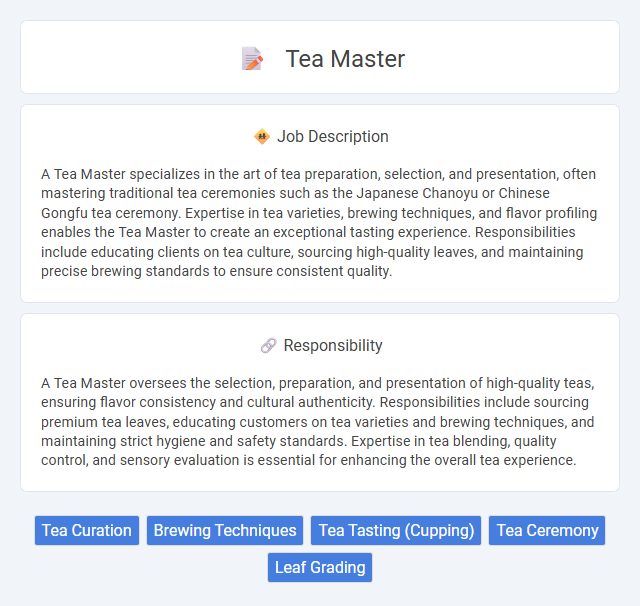
A Tea Master specializes in the art of tea preparation, selection, and presentation, often mastering traditional tea ceremonies such as the Japanese Chanoyu or Chinese Gongfu tea ceremony. Expertise in tea varieties, brewing techniques, and flavor profiling enables the Tea Master to create an exceptional tasting experience. Responsibilities include educating clients on tea culture, sourcing high-quality leaves, and maintaining precise brewing standards to ensure consistent quality.
Individuals who have a keen palate and patience are likely to excel as tea masters, since the role demands careful sensory evaluation and attention to subtle flavor profiles. Those with a passion for tea culture and a willingness to engage in detailed study could find this profession gratifying and well-suited to their interests. People who prefer dynamic, fast-paced environments or have little interest in culinary arts might find the job less compatible with their skills and preferences.
Qualification
A Tea Master must possess extensive knowledge of tea varieties, processing methods, and brewing techniques to ensure optimal flavor and quality. Professional certifications, such as those from the World Tea Academy or Tea & Herbal Association, enhance credibility and expertise in tea tasting and evaluation. Experience in sensory analysis, blending, and tea ceremony practices is essential for mastering the role.
Responsibility
A Tea Master oversees the selection, preparation, and presentation of high-quality teas, ensuring flavor consistency and cultural authenticity. Responsibilities include sourcing premium tea leaves, educating customers on tea varieties and brewing techniques, and maintaining strict hygiene and safety standards. Expertise in tea blending, quality control, and sensory evaluation is essential for enhancing the overall tea experience.
Benefit
A Tea master may likely experience benefits such as enhanced sensory skills and deep cultural knowledge, which can elevate their expertise and reputation in the tea industry. Opportunities for travel and collaboration with international tea producers could increase, broadening their professional network. Financial rewards might also improve over time as their mastery commands premium consulting and teaching roles.
Challenge
The role of a tea master likely involves a high level of expertise in selecting, blending, and brewing teas to achieve the perfect flavor profiles, which can pose significant challenges. Precision in temperature control and timing may be crucial, requiring careful attention to detail. Mastery of both traditional techniques and innovation may be necessary to meet diverse customer preferences and maintain consistent quality.
Career Advancement
A Tea Master specializes in the art and science of tea selection, brewing, and presentation, often advancing their career through gaining certifications in tea expertise and sensory evaluation. Progression can lead to roles such as Head Tea Sommelier, Tea Consultant for luxury hotels, or managerial positions in tea production companies. Mastery in tea culture, deep knowledge of terroirs, and expertise in tea ceremonies are critical for elevating career opportunities within the global tea industry.
Key Terms
Tea Curation
A Tea Master specializing in tea curation expertly selects and blends high-quality tea leaves to create unique flavor profiles that cater to diverse palates. Their deep knowledge of tea varietals, growing regions, and brewing techniques ensures a refined sensory experience and innovative tea collections. Mastery in tea curation enhances the appreciation of tea culture and elevates brand value through tailored offerings.
Brewing Techniques
Tea masters specialize in mastering brewing techniques that optimize flavor extraction from various tea leaves, including green, black, oolong, and white teas. They control water temperature, steeping time, and vessel type to enhance aroma and taste, often utilizing traditional methods such as Gongfu brewing. Precision in brewing ensures consistent quality, highlighting subtle notes and maximizing health benefits intrinsic to each tea variety.
Tea Tasting (Cupping)
A Tea Master specializes in tea tasting, also known as cupping, to evaluate the quality, flavor profile, and aroma of various tea leaves. This process involves a precise assessment of factors such as color, fragrance, taste, and mouthfeel, enabling the expert to distinguish subtle differences between tea varieties and batches. Mastery in cupping ensures the selection of premium teas for blending, packaging, and distribution, directly influencing product excellence and consumer satisfaction.
Tea Ceremony
A Tea Master specializes in the traditional art of the Tea Ceremony, mastering precise techniques such as whisking matcha, selecting ceremonial utensils, and maintaining an atmosphere of harmony and respect. Expertise in cultural rituals and deep knowledge of tea varieties enhance the authenticity and spiritual significance of each ceremony. Proficiency in guiding participants through the meditative experience fosters mindfulness and appreciation of Japanese tea culture.
Leaf Grading
Tea masters specialize in leaf grading, meticulously assessing tea leaves based on size, color, and texture to ensure consistent quality and flavor profiles. Their expertise directly influences the blending process, enhancing the aromatic and taste characteristics of each tea batch. This precision in leaf grading is essential for meeting consumer expectations and maintaining brand standards within the tea industry.
 kuljobs.com
kuljobs.com